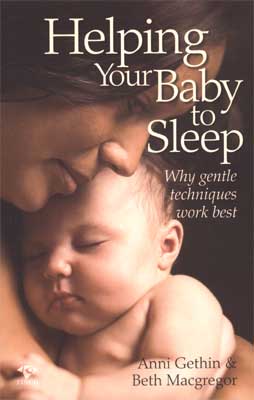
Time to end the distressing practice of controlled crying.
Every day new parents are being encouraged to train their child to sleep - a practice in which they ignore their babys crying and distress. In a groundbreaking new book, Helping Your Baby to Sleep, Australian educators Anni Gethin and Beth Macgregor draw on international research into babies emotional and brain development to show that gentle sleep techniques are best for babies. By contrast, they argue that the popular controlled crying approach can be detrimental for children and their parents.They state: "The stories parents tell about controlled crying are often truly shocking. Many babies are suffering extreme distress over many nights; it is common for parents to say that their babies scream hysterically and cry so hard that they vomit". Even in the best case scenarios
Controlled crying also frequently needs to be repeated once its initial effects wear off.
"Babies are ill-equipped to cope with this amount of stress. The brain structures that help us cope with stress are built in the first years of life by sensitive and responsive parenting. This is why gentle sleep techniques are so important and why controlled crying can be so harmful for babies."
"It is completely normal for babies to need help to get sleep, as the brain processes which allow them to go to sleep by themselves take time to develop. Leaving a baby alone and awake will often cause her primitive survival mechanisms to kick in, causing her to cry and scream for the safety of her parents."
"It is also normal for babies to wake up at night. Despite what parents are often told, there is no magic age at which a baby should be sleeping through. In fact, like walking and talking, the age at which babies will naturally sleep through the night varies widely. This is thought to be because the brain mechanism which governs sleep matures at different ages for different children. "
"Depriving a baby of parental care and contact at bedtime does not teach a baby independence; instead he learns that his parents cannot be relied upon to provide comfort and reassurance and so gives up calling for help. This is why controlled crying risks damaging the most important bond of all for a child - one that grows from being able to trust and depend on his parents."
"We also recognise that parents can suffer from the sleep deprivation that comes with a very wakeful baby. This is why we offer advice on how to address problems which can increase wakefulness, and how parents can get muchneeded support."
About the Authors:
Anni Gethin is a health social scientist with special interests in early childhood development and health equity. She runs a research and planning consultancy, lectures in public health and social science, and is a mother of three boys.
Beth Macgregor is a psychologist who trains health and welfare workers in infant mental health, child development and child protection. She has worked as a child protection caseworker, specialist and researcher, and is an active member of the Australian Association for Infant Mental Health. Her work as a specialist educator is devoted to creating happier children, families and societies. Beth is the mother of a delightful little boy.
Helping Your Baby to Sleep: Why gentle techniques work best
Finch Publishing
Authors: Anni Gethin and Beth Macgregor
ISBN 9781876451752
RRP: $24.95
www.finch.com.au



